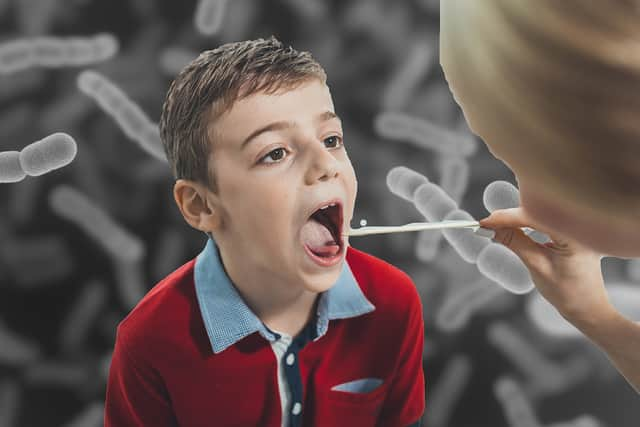Strep A: Bristol team hope to develop vaccine against the deadly infection
and live on Freeview channel 276
Scientists are researching group A strep in the hope of creating a vaccine against the infection.
The study, led by the University of Bristol, will use a new technique called the tonsil organoid model to help battle the invasive Group A streptococcus (iGAS) - which can cause diseases such as meningitis.
Advertisement
Hide AdAdvertisement
Hide AdThe trial is funded by the Spencer Dayman Meningitis Research which was set up this year in memory of Spencer who died of meningitis and sepsis at 14 months. Spencer died in 1982 and his family instantly got involved in fundraising, support groups and research projects.


His father, Dr Steve Dayman MBE, from the charity, said it was a "starting point" towards a vaccine.
He said: "Back then [1982] there were no vaccines to protect against bacterial infections causing meningitis and sepsis, now we have five vaccines in the UK vaccine program to protect against various strains of disease."
Group A Streptococcus is the name given to a type of bacteria sometimes found in the throat or on the skin. It usually results in mild but very infectious illness but can become the more serious invasive Group A Strep.
Advertisement
Hide AdAdvertisement
Hide AdThere is no vaccine to protect against group A strep, which can also cause rheumatic fever and scarlet fever.
The disease is spread person-person via respiratory droplets such as from coughing or sneezing and from touching skin or other surfaces contaminated with bacteria.
Symptoms include:
- flu-like symptoms, such as a high temperature, swollen glands or an aching body
- sore throat (strep throat or tonsillitis)
- a rash that feels rough, like sandpaper (scarlet fever)
- scabs and sores (impetigo)
- pain and swelling (cellulitis)
- severe muscle aches
- nausea and vomiting
The study will involve growing cells from the tonsils of patients who have had them removed during surgery. The team will then separate the cells and grow them in a laboratory alongside different parts of the strep A bacteria.
The immune response will then be measured to help them decide which parts of the bacteria could be included in a successful vaccine.
Advertisement
Hide AdAdvertisement
Hide AdScientists Dr Anu Goenka, Dr Alice Halliday and Dr Darryl Hill will led the project. Dr Goenka said: "This project will offer unique insights into the nature of the adaptive immune response to iGAS. We are very grateful to Spencer Dayman Meningitis Research for their generous financial support to enable us to undertake this important project."
Comment Guidelines
National World encourages reader discussion on our stories. User feedback, insights and back-and-forth exchanges add a rich layer of context to reporting. Please review our Community Guidelines before commenting.
